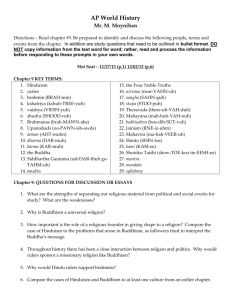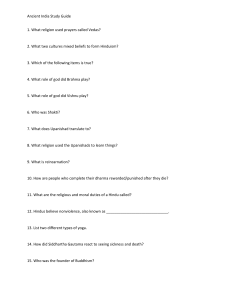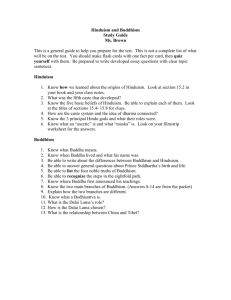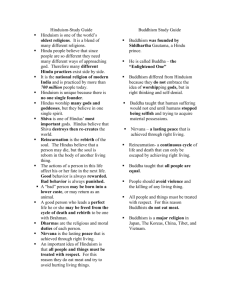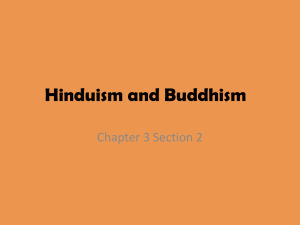Bell Work: What is something that you remember from
advertisement
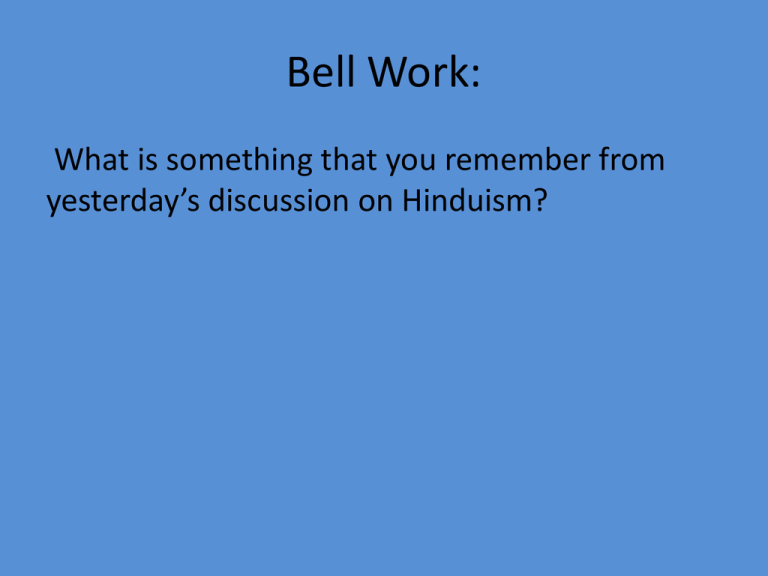
Bell Work: What is something that you remember from yesterday’s discussion on Hinduism? Buddhism Buddhism • Started out as a philosophy • Now considered a religion, but is “nontheistic” – No central god or deity • Founder: Siddhartha Gautama – B. 563 B.C – D. 487 B.C. (how old was he?) – “The Buddha” – means “awakened” or “enlightened” • Gautama was born into a wealthy Hindu family, but renounced his wealth to seek spiritual enlightenment. Background • Born in region along India/Nepal border • Father was a raja (king) • “Seers” or astrologers predicted he was someone great but would reject his legacy • So…his father kept him sheltered in the palace • Marries, has son • Finally leaves palace and encounters realities of life as an adult The Great Renunciation • Encounters: poverty, old age, sickness, and death. • After meeting a holy man, he decides to try to find the meaning of life – Renounces royal title, all material belongings, left palace, wife and kids – Wanders around, experiences enlightenment and becomes “the Buddha.” Shares his teachings =Buddhism ~Buddhism spread through cultural diffusion to eastern Asia, including China, Thailand, Korea and Japan. ~In other areas, Buddhism was adapted and took on new forms. Read: • The article: “The Buddha: What Did He Teach?” • Answer the questions on the back. • Be prepared to discuss the answers with the class. Bell Work: • 15 minutes to complete the article: “The Buddha: What Did He Teach?” • Answer the questions on the back. • Be prepared to discuss the answers with the class. • Attendance and Tardies • Code Red Belief Types • Polytheistic Religion – More than one god. • Monotheistic Religion – Single all powerful god. • Atheistic – Expressly states there are no divine beings. • Non-Theistic - A non-theistic religion does not center upon the existence of any deities, but it does not deny their existence either. As such, members can easily be a collection of atheists, agnostics and theists. Buddha’s Teachings • The Four Noble Truths: 1. Life is subject to sorrow. 2. Sorrow is caused by our cravings or desires, which come from being ignorant. 3. Sorrow can be eliminated by eliminating cravings/desires. 4. The way to eliminate cravings/desires is to follow the Eightfold Path or “Middle Way.” Eightfold Path 1. 2. 3. 4. Right views Right intentions Right speech Right action 5. Right livelihood 6. Right effort 7. Right mindfulness 8. Right concentration By following the Eightfold Path, the ultimate goal is to eliminate sorrow and achieve “nirvana” or true enlightenment. Buddhism has much in common with Hinduism, but important differences. Buddhism like Hinduism: But not Reincarnation Caste system Karma – the sum of all your deeds good and bad Hindu gods Dharma – right behavior Hindu priesthood Buddha did not record his teachings, but after he died, his followers collected them into the Tripitaka. https://www.youtube.com/watch?v=O0Q1lrxQlMU Today’s Tibetan Buddhists are led by the Dalai Lama, who advocates for freedom from China. Chart on World Religions Quiz on Friday over Hinduism and Buddhism Plus/Delta


